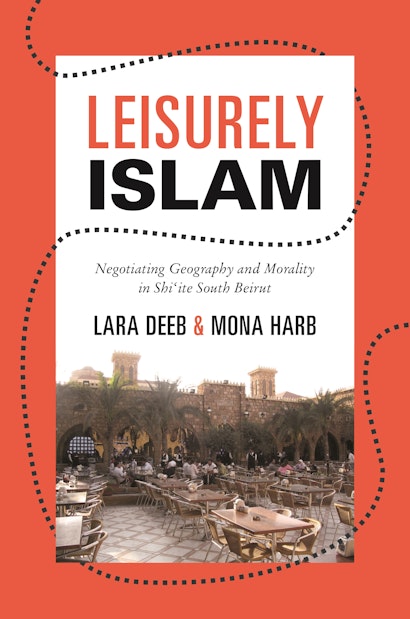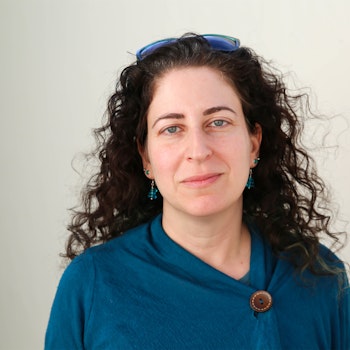South Beirut has recently become a vibrant leisure destination with a plethora of cafés and restaurants that cater to the young, fashionable, and pious. What effects have these establishments had on the moral norms, spatial practices, and urban experiences of this Lebanese community? From the diverse voices of young Shi’i Muslims searching for places to hang out, to the Hezbollah officials who want this media-savvy generation to be more politically involved, to the religious leaders worried that Lebanese youth are losing their moral compasses, Leisurely Islam provides a sophisticated and original look at leisure in the Lebanese capital.
What makes a café morally appropriate? How do people negotiate morality in relation to different places? And under what circumstances might a pious Muslim go to a café that serves alcohol? Lara Deeb and Mona Harb highlight tensions and complexities exacerbated by the presence of multiple religious authorities, a fraught sectarian political context, class mobility, and a generation that takes religion for granted but wants to have fun. The authors elucidate the political, economic, religious, and social changes that have taken place since 2000, and examine leisure’s influence on Lebanese sociopolitical and urban situations.
Asserting that morality and geography cannot be fully understood in isolation from one another, Leisurely Islam offers a colorful new understanding of the most powerful community in Lebanon today.
Awards and Recognition
- Winner of the 2014 British-Kuwait Friendship Society Prize in Middle Eastern Studies
- One of Choice's Outstanding Academic Titles for 2014
"This outstanding ethnography of contemporary urban Middle Eastern life focuses on Hezbollah young adults, about whom people are generally misinformed, an effort of critical value to scholars of religion and politics as well as anthropologists. . . . The authors brilliantly illustrate the variety and complexity of moral choice, ethnic insularity, and worldliness with respect to other neighborhoods and populations."—Choice
"Leisurely Islam provides an interesting study of an area many people know very little about. It will interest scholars and students alike. While the book speaks particularly to those working on Lebanon and the Middle East, it will also be relevant to researchers dealing with issues regarding youth, morality, space and diversity in general."—Marianne Holm Pedersen, Social Anthropology
"Overall, Leisurely Islam [is] a powerful, important, and well-researched text, the significance of which extends far beyond the realm of leisure. I attribute a great deal of the book's success to its multidisciplinary approach. The book doesn't neatly fall within the discipline of either author but instead draws upon the expertise of both. Perhaps more importantly, the book nicely integrates multiple forms of data, from religious texts: ethnographic data (both detailed observations and interviews); and market research (on cafes in Dahiya, size, location, etc.): to urban spatial analysis and so on. Brought together in a masterful way, this cornucopia of data enables the authors to paint a richer picture of Dahiya than would have been possible using any one methodology or data source alone."—Jane Lief Abell, Allegra
"Particularly well referenced, with an unprecedented amount of information, this book is an important tool for those interested in this region."—Erminia Chiara Calabrese, REMMM
"Café culture has been an integral part of life in the Middle East for centuries, but Deeb and Harb present it as a lens through which to understand the shifting morality of the people of southern Lebanon. This is an important and fascinating study that will be read and discussed for years to come."—Reza Aslan, author of No god but God: The Origins, Evolution and Future of Islam and Zealot: The Life and Times of Jesus of Nazareth
"Through the mapping of an emergent café culture that signals and feeds new desires for sociability and public leisure by 'more or less pious' youth, this engaging and nonjudgmental book guides us through the surprisingly complex moral rubrics and creative religious interpretations of a new generation in the Shi'a neighborhood of South Beirut. In marvelous detail, we learn how young men and women, and those who seek their business, are refiguring their neighborhood, social relations, and the whole city of Beirut, where class, sect, and geography are tightly interwoven."—Lila Abu-Lughod, Columbia University and author of Do Muslim Women Need Saving?
"This well-argued and well-organized book will greatly interest all those working on the subject of the contemporary Middle East, in particular Beirut and Lebanon. The authors challenge the view that the southern suburb of Dahiya is closely linked to Hezbollah and they introduce a number of theories to better understand the new forms of leisure that have surfaced in Dahiya during the last decade."—Jørgen BÆk Simonsen, University of Copenhagen


